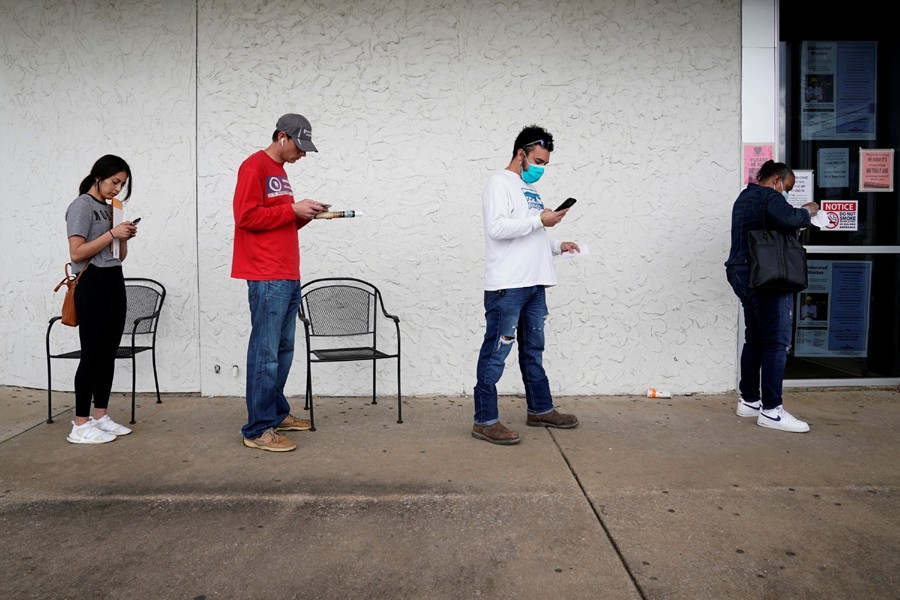The number of initial jobless claims in the United States rose to 1.43 million last week amid a resurgence in COVID-19 cases, following an increase in the previous week, the Labor Department reported Thursday.
In the week ending July 25, the number of Americans filing for unemployment benefits increased by 12,000 from a revised 1,422,000 in the prior week, the department said.
Initial jobless claims peaked at a record 6.87 million in the week ending March 28 amid COVID-19 shutdowns, and the figures have declined for 15 weeks consecutively, before the trend was reversed in the week ending July 18, reports Xinhua.
With the latest numbers, a staggering 54.1 million initial jobless claims have been filed over the past 19 weeks, indicating the mounting economic fallout of the COVID-19 pandemic.
The new report also showed that the four-week moving average, a method to iron out data volatility, increased by 6,500 to 1.37 million.
The advance seasonally adjusted insured unemployment rate was 11.6 percent for the week ending July 18, an increase of 0.5 percentage point from the prior week's revised rate, the report showed.
The latest data "confirms that the economy's recovery has lost momentum in recent weeks," Sarah House, senior economist at Wells Fargo Securities, wrote in an analysis.
As Republican and Democratic lawmakers continue to debate the extension of the extra 600 dollars unemployment benefits, which are set to expire Friday, House said the "stakes are high" with more than 30 million workers collecting unemployment insurance.
The Senate Republicans' 1-trillion-dollar proposal, revealed Monday, would slash the federal unemployment benefits from 600 dollars to 200 dollars through September, giving an unemployed worker about 70 per cent of previous wages when combined with state benefits, while Democrats want to maintain the current level of benefits through January.
The White House and Republicans have contended that the 600-dollar benefits have created a financial disincentive for people to return to work, an argument refuted by some economists, including Nobel laureate economist Paul Krugman.
"The bottom line is that all those concerns that we were keeping unemployment high by making it too comfortable had zero basis in reality," Krugman said on Twitter. "UI (unemployment insurance) was helping employment, not hurting it."
The jobless data was released on the same day when the US Commerce Department reported that the economy contracted at an annual rate of 32.9 per cent in the second quarter, the deepest decline since the government began keeping records in 1947.
Over 20 states have already paused or partially reversed reopening efforts amid an alarming resurgence of COVID-19 cases, which, according to analysts, could undermine the nascent economic recovery.
The US Federal Reserve on Wednesday kept its benchmark interest rate unchanged at the record-low level of near zero, and expects to maintain the rate "until it is confident that the economy has weathered recent events."
In a statement after concluding a two-day policy meeting, the Fed also noted that the path of the economy will depend significantly on the course of the virus.
"Control of the disease is both necessary and sufficient to promote recovery of the economy," Adam Posen, president of Washington-based think tank Peterson Institute for International Economics, told Xinhua.
"Failures in public health will lead to de facto economic shutdowns, whether or not the local or federal governments issue the shutdown orders," Posen said. "The difference between lockdown and not is in how fast you get control of the outbreak, not the economy."


